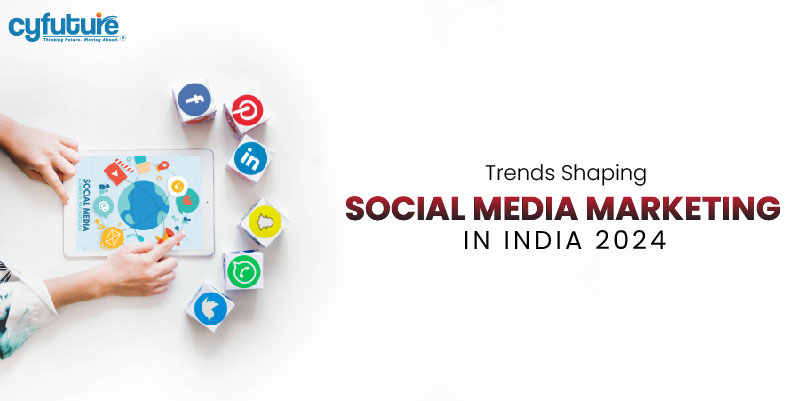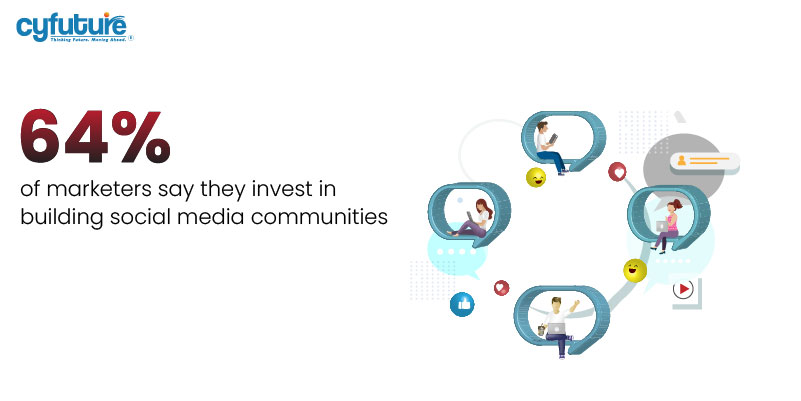-
Get Cloud GPU Server - Register Now!
Toggle navigation

Social Media Marketing has proven to be the greatest asset for small and medium-scale organizations in 2023. There is no denying that businesses that have leveraged the power of social media marketing have witnessed exponential growth. Social Media Marketing has truly transformed how businesses sell their products, and services online, how they interact with the customer, and how they promote and market their existing products. To stay current and effectively interact with their target audience in the ever-evolving world of social media marketing, businesses need to keep aware of the changing environment and embrace the newest trends. With the year 2024 upon us, the Indian social media landscape is undergoing radical transformations propelled by technological breakthroughs, changing user tastes, and altered commercial dynamics. The key to developing an effective digital strategy is realizing these changes and making the necessary adjustments.
The way that material is consumed is being redefined by technological advancements, with video content taking center stage. Brands are using immersive formats, like live streaming and short-form films, to connect with viewers genuinely. Additionally, micro and nano influencers are being added to the ecology of influencer marketing to cater to specialized audiences, as it moves toward authenticity and diversity. The transient quality of stories, which defines ephemeral material, is making a comeback and giving stories a feeling of urgency and immediacy.

Social media marketing is a dynamic digital strategy that connects audiences, establishes brand presence, and advances corporate objectives via the use of social media platforms. It entails developing and disseminating material specifically for each platform, interacting with followers, and doing data analysis to improve tactics. Social media marketing uses the power of sites like Facebook, Instagram, Twitter, and LinkedIn to promote meaningful connections with the main objective of raising brand recognition. To achieve optimal engagement and satisfy marketing objectives in the always-changing world of digital communication, the method consists of several strategies, including content production, influencer partnerships, and data-driven decision-making.
The Indian social media scene is about to undergo significant changes as 2024 approaches. With a user base that is expanding quickly and a demand for online content that is growing, marketers must keep up with the times to effectively engage their viewers. In 2024, the following major developments will influence social media marketing in India:
In 2024, short-form video content will still be king. Social media consumption has already been transformed by apps like YouTube and Instagram Reels, and their impact will only increase. Therefore, producing interesting, snackable video content that instantly grabs viewers’ attention should be a top priority for brands. This covers genres such as interactive challenges, user-generated material, lessons, and behind-the-scenes looks. Furthermore, these videos can be informational, promotional, or provide insights into a business.
The days of massively popular influencers with millions of followers are coming to an end. Companies are starting to pay more attention to micro-influencers, who have tiny but very active networks. Better conversion rates and brand endorsement result from these specialized influencers’ frequent command of higher levels of loyalty and trust. Additionally, working with micro-influencers saves money and enables more focused marketing initiatives.
The landscape of social media marketing is fast evolving due to artificial intelligence (AI). AI technologies are a useful tool for brands to use in audience behavior analysis, targeted advertising, and tailored content production. Artificial intelligence (AI)-enabled chatbots may respond to queries, manage customer care requests, and offer real-time assistance, all of which improve the customer experience.
Online shopping and browsing are becoming more relevant with social commerce. Apps on social media sites like Facebook and Instagram include easy-to-use purchasing features. These features redirect the users directly to the website’s payment or checkout pages which streamlines the buying experience. In 2024, this trend will still be gaining traction and enable marketers to turn social media interaction straight into purchases. Additionally, growth in social commerce will be fueled by influencer partnerships, live shopping events, and interactive product demos.
Voice search is already playing a key role in today’s digital era. Social media material has to be strategically optimized due to the increase in voice search, especially on mobile devices. To match customers’ vocal inquiries, brands need to employ natural language phrasing and relevant keywords. To improve content discoverability and make sure that it is found when users use voice commands to look for information, this optimization is essential. By adjusting to this trend, social media tactics become more visible and in line with the changing behavior of users, creating a smooth and intuitive experience in the era of voice-driven interactions.
In 2024, community development will take center stage. Brands must concentrate on producing captivating content that encourages user engagement, such as real-time Q&A sessions and timely replies to messages and comments. Brands may enhance audience interactions and encourage brand loyalty by fostering a feeling of community and belonging. This will establish a sense of trust and loyalty towards the brand among consumers which ultimately leads to increased sales and revenue.
In today’s consumer landscape, authenticity and transparency are paramount. Social media platforms serve as a powerful canvas for brands to unveil their core values, mission, and narratives unfolding behind the scenes. Thus, the strategic sharing of user-generated content, authentic employee testimonials, and timely real-time updates cultivates trust. This transparent approach not only resonates with consumers seeking genuine connections but also humanizes the brand, fostering a relatable and trustworthy image. Thus, in the era of social media, this emphasis on authenticity stands as a cornerstone for brands striving to build enduring relationships with their audience.
Making decisions based on data is essential in the era of precision marketing. To understand their audience, track the effectiveness of campaigns, and adjust their plans, brands need to leverage data insights. By 2024, social media analytics systems and audience insights dashboards will be indispensable tools. They will be a key asset in providing a wealth of information for astute and knowledgeable strategic decision-making. In addition to offering insight into campaign performance metrics, these solutions help businesses stay adaptable, responsive, and in step with the shifting demands of their target audience.
In 2024, AI integration is poised to revolutionize social media marketing. AI-driven tools will enhance efficiency in various aspects, from customer service chatbots providing instant responses to analytics tools offering deep insights into user behavior and content performance. Thus, businesses will be able to keep ahead of new trends, customize tactics to audience preferences, and make well-informed decisions. AI’s smooth integration will improve social media marketing’s overall efficacy and streamline operations by making it more individualized, effective, and sensitive to the ever-changing needs of the digital world.
In the ever-evolving landscape of social media, staying compliant with regulations is paramount. Social media platforms regularly update their policies, posing a challenge for brands to stay aligned. Brands that adapt swiftly and ensure compliance with the latest guidelines avoid penalties and also shield themselves from negative publicity. For brands, staying informed is a strategic necessity for navigating the intricate web of evolving regulations in the digital ecosystem.
In conclusion, as we anticipate the transformative journey of social media marketing in India in 2024, the landscape is set to witness dynamic shifts. This transition will be fueled by technological advancements, changing user preferences, and evolving commercial dynamics. The video will continue to reign supreme, with short-form videos and immersive formats taking center stage. The era of micro-influencers will gain momentum, emphasizing authenticity and trust in brand partnerships. AI integration will revolutionize marketing strategies, offering personalized and efficient solutions, while social commerce will further bridge the gap between browsing and buying. The rise of voice search, community building, and a steadfast commitment to authenticity will redefine brand-consumer relationships.
In essence, data-driven decision-making will be the cornerstone, facilitated by advanced analytics tools, ensuring brands stay agile in responding to market trends. As AI becomes an integral part of social media marketing, compliance with regulations remains crucial for navigating the digital landscape. Brands that embrace these trends and adapt swiftly will not only survive but thrive in the competitive world of social media marketing. Additionally, this will result in fostering meaningful connections and driving sustained success in the digital age.
FAQs
Q1 What are the benefits of social media marketing?
Answer: Businesses may gain a lot from social media marketing, such as better brand loyalty, more website traffic, and more brand awareness. Additionally, it offers a direct line of communication with the intended audience, establishing deep bonds and long-lasting clientele. Furthermore, social media networks provide affordable advertising choices that allow for exact targeting according to interests and demographics. Businesses may develop thought leadership in their sector, humanize their brand, and show off their authenticity via the creation of strategic content. Social media facilitates real-time communication for businesses, allowing them to promptly address queries and problems raised by clients. Ultimately, cultivating a vibrant and interesting online presence aids companies in growing and preserving their competitiveness in the digital arena.
Q2 How can we promote new products with social media marketing?
Answer: To promote new products through social media marketing, leverage engaging content such as visually appealing images and videos. Moreover, utilize targeted advertising on platforms like Facebook and Instagram to reach specific demographics. You can additionally run contests, giveaways, or exclusive promotions to generate excitement. Furthermore, collaborate with influencers to amplify reach and credibility. Encourage user-generated content and testimonials to build trust. Consistent and strategic posting, along with interactive features like polls and Q&A sessions, ensures an effective product launch strategy.
Q3 Is social media marketing the same as digital marketing?
Answer: Despite certain similarities, social media marketing is a subset of digital marketing as a whole. Digital marketing usually covers a larger variety of platforms such as Emails, social media, search engines, and websites whereas social media marketing primarily focuses on social media platforms. In particular, social media marketing focuses on using Facebook, Instagram, Twitter, and other channels for marketing initiatives and consumer interaction. Digital marketing services requires a complete approach that incorporates social media with other digital channels for a full online presence. Social media platforms are essential for engaging and influencing the target audience in the context of digital marketing services.
Q4 What are the drawbacks of social media marketing?
Answer:
Drawbacks of social media marketing include:
Time-Consuming: Managing multiple platforms and creating engaging content can be time-intensive.
Negative Feedback: Negative comments or feedback can harm a brand’s reputation.
Algorithm Changes: Platform algorithms change, affecting organic reach and engagement.
Dependency: Relying solely on social media can be risky; diversification is advisable.
Costs: While organic reach is possible, paid advertising can become expensive.
Privacy Concerns: Increasing concerns about data privacy and potential backlash.
Platform Saturation: Saturated platforms may make it challenging to stand out.
Metrics Complexity: Analyzing and interpreting metrics can be complex and time-consuming.